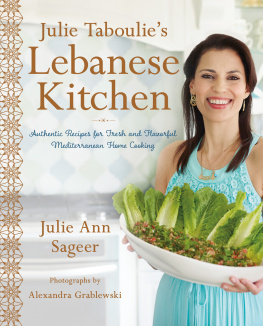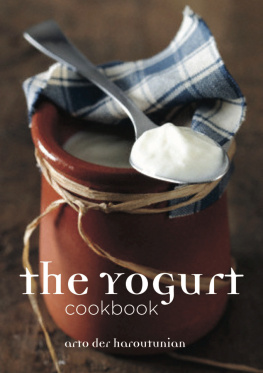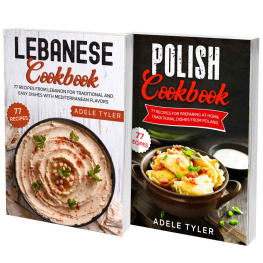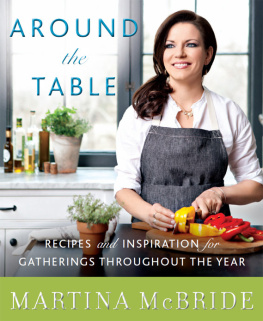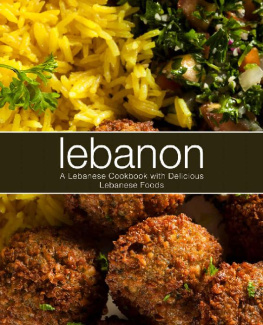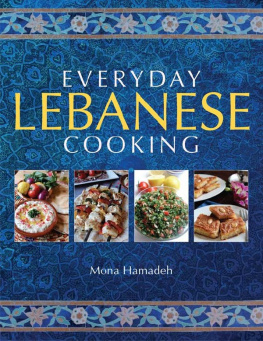Contents
Guide
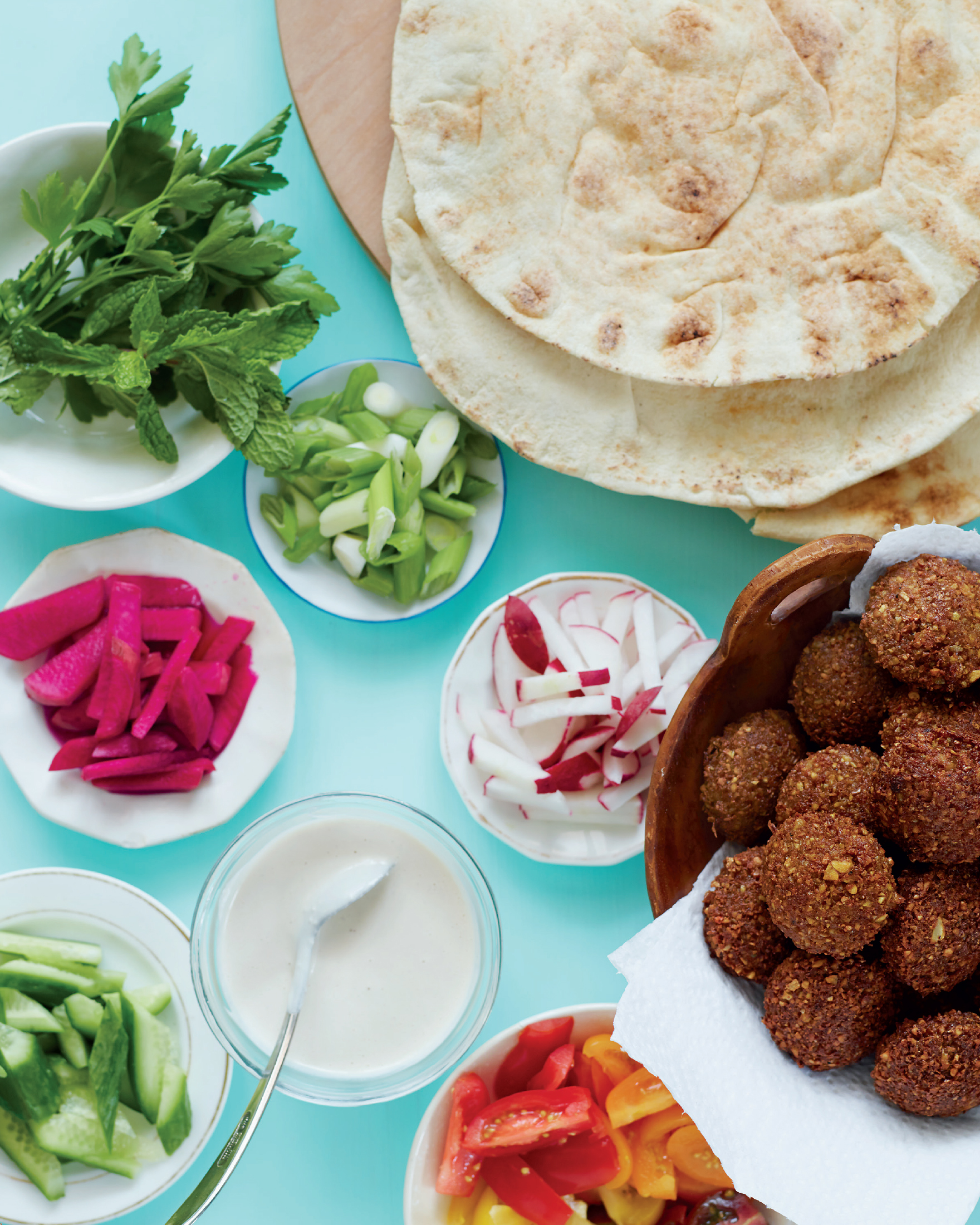
Julie Taboulies
Lebanese
Kitchen
Authentic Recipes for Fresh and Flavorful
Mediterranean Home Cooking
Julie Ann Sageer
with
LEAH BHABHA
PHOTOGRAPHS BY ALEXANDRA GRABLEWSKI

ST. MARTINS GRIFFIN
NEW YORK

The author and publisher have provided this e-book to you for your personal use only. You may not make this e-book publicly available in any way. Copyright infringement is against the law. If you believe the copy of this e-book you are reading infringes on the authors copyright, please notify the publisher at: http://us.macmillanusa.com/piracy.
To my mentor, master chef, and miraculous mother, Mama.
I would not be here without you. I could not do this without you.
I wouldnt be the woman and chef that I am today without you.
Because you believed in me, I believed in me. I believe in you. I am blessed to have
you as my mother. I love you with all of my heart and soul forever more.

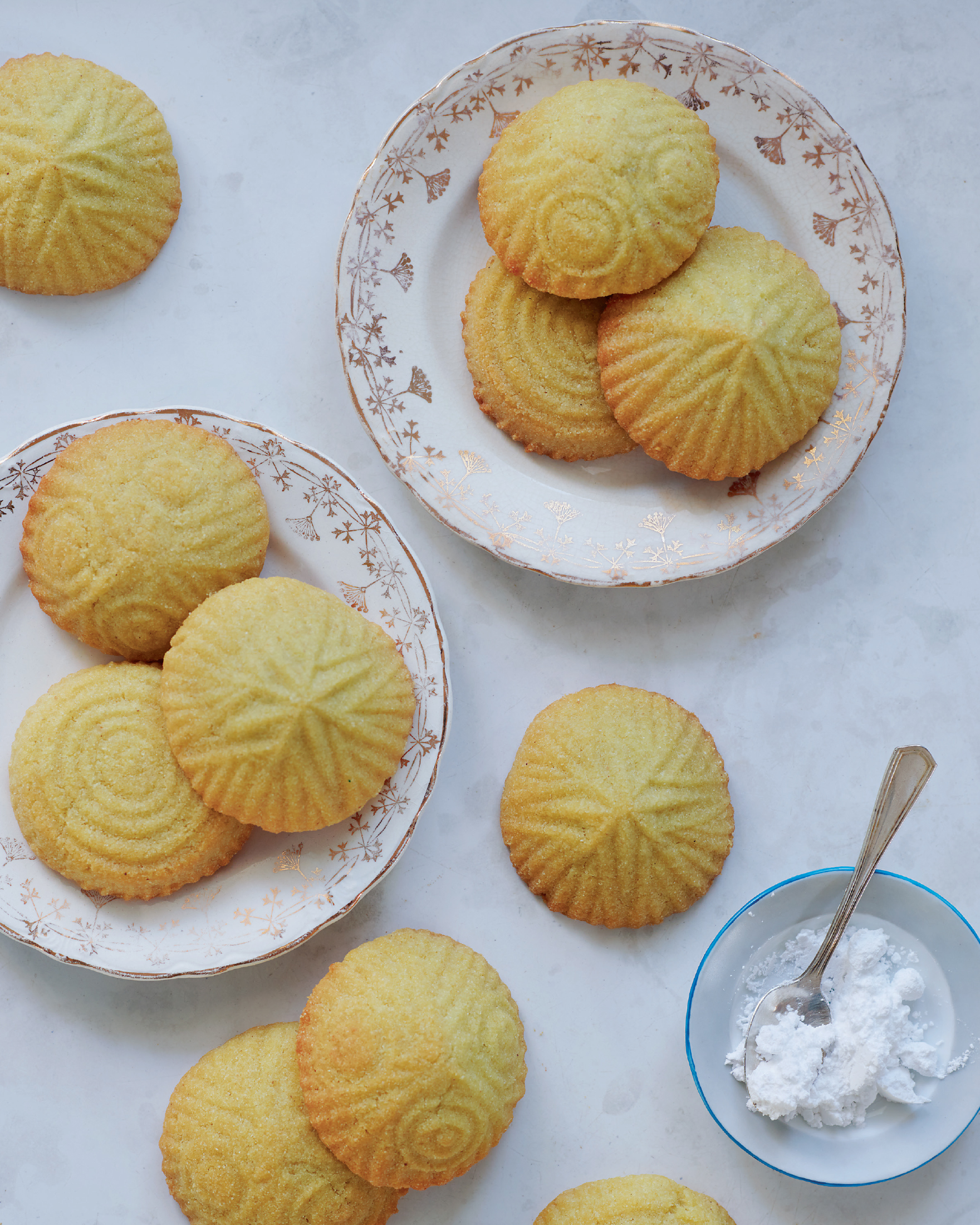

I AM SIX YEARS OLD, A BOUNCY TANNED KID WITH LONG BROWN HAIR AND lots of energy. On this sunny afternoon, I am completely and totally focused on the task at hand: picking nana (fresh mint) from our garden. I carefully select the largest, greenest leaves, slowly running my fingers around their outer ridges. I am surrounded by the plants heady, refreshing scent, and I cant wait to return to the kitchen and show the spoils to Mama, who is preparing one of my absolute favorite dishesand one that accompanies most of our meals: taboulie.
When I enter the kitchen, Mama has an enormous wooden bowl in front of herthe biggest bowl I can imagine. I perch myself on a kitchen stool and watch carefully as she finely dices the vine-ripe tomatoesalso from our garden and hand-picked by yours trulyand meticulously chops up the fragrant parsley, always with a sharp knife so the leaves dont bruise. She inspects the nana with approval, and Im on to my next task: lemons. My small hands grasp each lemon wedge, squeezing as hard as my little palms let me, and carefully picking out any pips that fall into the bowl. When my hands can squeeze no more, I pluck each mint leaf off the stem, so it, too, can be added to this enormous bowl of flavor. After a thorough chopping, in goes the mint, followed by the fine beige grains of soaked bulgur wheat, and then the rest of the diced vegetables and remaining herbs.
I watch closely as Mamas hands slide up and down the side of the bowl, as she weaves her fingers in and out of the mixture, so that every bite contains a morsel of each ingredient. Now its time for the olive oil, and I hold the slippery bottle carefully, pouring a thin, steady stream into the bowl, before Mama instructs me to stop, and I add some of my hand-squeezed lemon juice. A little more lemon juice, Joule she tells me, and I pour it in, before grinding the pepper and salt into the mixture, because few dishes are complete without these two star ingredients. After a final mix comes my favorite part: taste testing. Mamas hands are slick with oil as she reaches for a crisp romaine lettuce leaf, into which she scoops some of the fresh taboulie. I open my mouth as wide as possible, and take in the tastes and texturesthe crunchy salad, firm beads of wheat, and an avalanche of refreshing flavors with a tang of lemon juice at the end. How is that, habibi? she asks me, and I nod vigorously, trying to smile with my mouth full, my eyes open wide with excitement. With my seal of approval, the taboulie joins the rest of Mamas dishes on our table, each more delicious than the last.
I may no longer be six years old, but my love of preparing and eating tabouliethis essential Middle Eastern dishhas never waned, not even for a second. Its no accident, then, that the grain salad has become an irreplaceable part of my identity. When I meet the wonderful fans of my TV show Cooking with Julie Taboulie, the first question Im always asked is Is Julie Taboulie your real name? The answer is no, not legally, but it might as well be! Growing up in Utica, a small industrial town in upstate New York, I was constantly surrounded by the many members of my tight-knit family and the towns large Lebanese community. When I was just six or seven years old, my uncles gave me the nickname Julie Taboulie after noticing my obsession with the dish, and food in general. Like hummus to pita, the name stuck and continues to stickits even shaped my entire career!
But how did I turn a family nickname into a cooking show watched by audiences throughout North America? Well, like every good story, its a long one, so take a seat and a sticky square of baklawa and hear me out. In 2007, I was living in New York City hosting, writing, and producing television segments for Bloombergs NYCTV. I found that as fun as the red-carpet segments and charitable event coverage were, I was always especially drawn to the food-focused pieces. Not that I dont love flowing gowns and fancy events, but food, now that, I could sink my teeth into. When I wasnt on TV, I was watching TVfood TV. I soon noticed that there werent any Lebanese or Middle Eastern cooking shows and that whenever an American TV chef was creating Lebanese food I was yellingyes, yellingat the TV. Youre not supposed to bake those and thats not what thats called! I would scream at the television, knowing that none of their dishes and concoctions could compare with the magical tastes that I enjoyed in my Mamas kitchen.
In the summer of 2007, a fantastic opportunity presented itself to me: a month-long trip back to the old country, Lebanon, a place which had deeply impacted my identity even though Id never visited. Growing up I had heard so much about my Lebanese family, as my mother had come to the U.S. with only her brothersleaving her four sisters and parents behind. On the rare occasions that my Sitto (maternal grandmother) visited us, I relished her stories and company, and wished I could return with her to experience the country of my parents youth. I had spent so long as a child wondering what Lebanon was likehow it looked and smelled, how it was different from our home in upstate New York, and, of course, how the food tasted compared with ours. Politically, Lebanon has often been a place of turmoil, but my family had always spoken of it with so much affection and nostalgiaI had to see for myself.
On August 1, 2007, after thirteen hours of travel and a distance of six thousand miles, I found myself on my Sittos doorstep, where a crowd of family members was waiting for me. I stepped out of my uncles car, and into my grandmothers outstretched armsarms I hadnt encountered in more than ten yearsbringing tears to both of our eyes. After the many hugs and kisses, we shared my welcome mealwhich was fit for a queen. For the rest of the month, I explored my Lebanese roots with my eyes wide open, sleeping in the bed my mother had slept in during her childhood, and embracing my beloved culture. My Arabic flourished in Lebanon, as I improved my speaking and comprehension skills encouraged by my loving (and patient!) family. With each day, I saw more and more of myself in my relatives: my love of cooking and feeding people and my endless capacity for conversation and curiosity.

